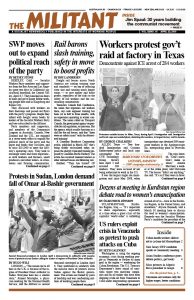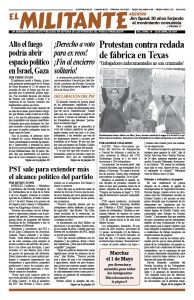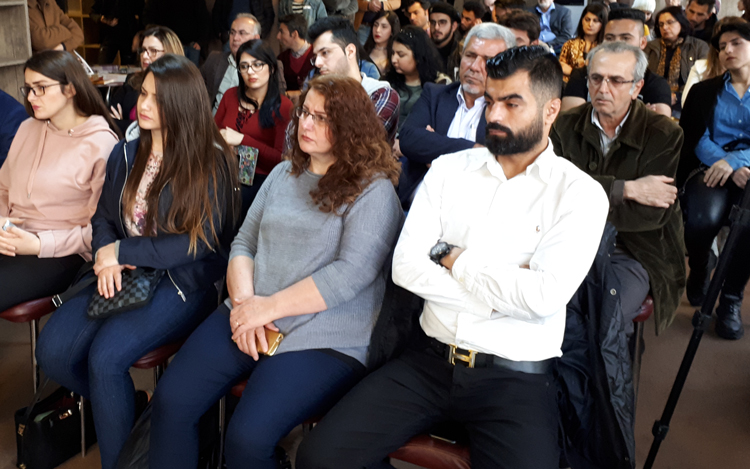SULAYMANIYAH, Kurdistan Region, Iraq — “It’s important to share experiences, especially at a time when a great crisis of the capitalist ‘world order’ is unfolding around all of us – here in the Kurdistan Region, in the United States, and elsewhere,” Alyson Kennedy told a March 30 meeting here to discuss the road to women’s emancipation. Kennedy was the Socialist Workers Party’s candidate for president of the United States in 2016.
Sixty women and men of all ages participated in the lively exchange, hosted by youth organizations Tema and Nova. Savan Ako welcomed participants on their behalf and introduced the two speakers, Kennedy and local women’s rights activist Dashne Nariman. “We want to be a platform for discussion,” Ako said, “in the hope of making radical changes and seeing men and women hand in hand, shoulder to shoulder.”
Kennedy, who is the 2019 SWP candidate for mayor of Dallas, pointed out that Texas has a high percentage of young working-class men and women who are military veterans. “Most are pushed into the army by unemployment and other economic conditions. They were sent to fight and die in the U.S. government’s wars. These wars aren’t popular among working people. When I return home, I will talk about what I learned here and what these wars have meant for you.”
The consequences for working people of Washington’s never-ending military actions are part of a wider social crisis in the U.S, Kennedy said. “The load falls on the family, especially women, who bear most of the responsibility for the care of children, the sick and the elderly.”
Women, oppression, and labor
“Women’s place in human society wasn’t always degraded,” Kennedy said. “That oppression has an economic and social origin — the rise of class society, of private property and the state. If it had a beginning, then it can be ended as well.”
Kennedy pointed to lessons taught by SWP leader Evelyn Reed in books such as Problems of Women’s Liberation, Woman’s Evolution, and Is Biology Woman’s Destiny? Reed, who was a leading participant in the women’s rights movement of the 1960s and ’70s, showed that in early human society women were held in high esteem. “Social production was organized communally and its product shared equally,” Kennedy said. “Women had a central place as producers and as the nurturers of new human life.”
“The decline in the status of women developed as the growing productivity of human labor produced a surplus — wealth — that came to be privately accumulated. Women and their children, like cattle, became private property. Women’s status was determined by the man and the family to whom they were subordinate.”
Kennedy emphasized the importance of the expansion of women working outside the home over the last half-century, describing her own experience of how women gain new confidence in leading fights for social, economic and legal rights.
“I began working in the coal mines in 1981 in West Virginia. I and other SWP members were among thousands of women who fought to work in mines. We were confident we could do the work — and we proved it.
“At first, some mine bosses, as well as some male co-workers, harassed women, trying to get us to quit. But working side by side with men breaks down these divisions. We won support from the United Mine Workers union. We began to see each other as co-workers and co-fighters.”
Nariman opened by saying she agreed with Kennedy on the origins of women’s oppression, so she wouldn’t say much on that. She described struggles for women’s rights in Kurdistan and Iraq over the past century in face of imperialist domination and political tyranny.
“The Iraqi state was established in the 1920s by British imperialism. Imperialism brought capitalism.” Women fought for their rights in the ’20s, ’30s and ’40s as part of the movement against imperialism.
Nariman said that from the mid-1970s, Saddam Hussein’s tyrannical regime had channeled the struggle for women’s rights into support for the ruling Baath Party. “The numbers of women working in professions rose dramatically,” she said. “But women’s emancipation didn’t advance. The number of women workers changed based on needs of the capitalist market. They were a reserve army of labor.”
From family to economic bondage?
“Yes, it’s important for women to come out of the home, out of domestic bondage,” Nariman said. “But we shouldn’t forget that this is simply going from family bondage to economic bondage. … Only the form of women’s oppression has changed. It’s not emancipation. We must go to the root of the problem: capitalism.”
These differing views on the importance of women’s participation in the labor force and other issues were joined in the discussion period. A number of speakers said they were members of left-wing political groups. One man criticized Kennedy for participating in elections, saying this was the opposite of empowering workers. Another spoke in a similar vein, scorning the demand that women control their own property and wages. “This serves capitalism,” he said.
In her talk, Kennedy had explained that the fight for immediate and democratic demands that take on all forms of discrimination against women is part of mobilizing their strength as part of revolutionary struggles to conquer state power and establish a workers and farmers government. “SWP candidates get a hearing among working people when we raise that perspective,” she said.
Common labor, common fights
Steve Clark, a member of the SWP National Committee and editorial director of Pathfinder Press, spoke from the floor. “As Dashne said, the bosses employ women to exploit them and make profits, just as they do men. And they superexploit women and make an even greater rate of profit.
“What’s important for the workers movement, however,” Clark said, “is that when women work outside the home or break out of ‘women’s jobs,’ they become part of what Marx — referring to all workers, regardless of sex — called the ‘gravediggers of capitalism.’
“They gain confidence through common labor and common fights alongside men,” Clark said. “Women become leaders, including leaders of men in struggle, not just of other women.”
Lessons from socialist revolutions
The final person to take the floor attacked both Kennedy and Nariman for pointing to the socialist revolutions in Russia and Cuba as examples for working people today. “That’s all in the past,” he said. “There is a revolution going on right now in northern Syria, in Rojava. Why don’t you talk about this?”
“You talk about work. I don’t want to work, I want freedom!” he said.
Kennedy responded to this tirade. Returning to the common interests of workers and farmers in the United States and the Middle East, and the social crisis wrought by imperialist wars, she said, “There will be more rebellions, there will be revolutionary struggles. That’s why it’s important to learn about what working people accomplished in Russia and Cuba. And the Cuban Revolution is not in the past; it’s a living revolution.”
After the meeting, Ako told the Militant that the organizers were pleased with the turnout and with the chance to collaborate with workers from other countries to shed light on the road to women’s emancipation. “We will have more discussions and continue spreading knowledge of the issue,” she said.


